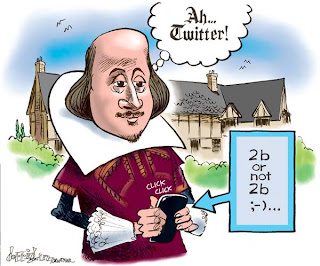I believe that Sugata Mitra has a much more plausible vision of where education should go in the future. Teachers should act as conduits of knowledge—asking the main questions and directing their students to the answers (however subtly). Mitra hints that group learning seems more prevalent in the future as it encourages variety among the students in their opinions. Finally, technological advances seem inevitable, so that students may rely on the web to further inform them.
So what do I plan for my 12th grade literature class to be like?
Easy.
I would like for my students to learn to value of education itself.
I know this may sound sort of silly, but it seems to me that in America education is often taken for granted. If I could teach my students anything, it would be the importance of learning—and I don’t necessarily mean the importance of learning literature.
Secondly, I would like my students to master the art of communication. Communication is key to living life well, I believe. Without effective communication, tasks like getting a job, finding a spouse, keeping a job, and keeping a spouse would be much more difficult if not impossible. The importance of communication is especially relevant in our technological world today. I would hate to see any spoken language perverted by wrds lk ths 4evr. And I certainly hope that I am not alone in this belief.
So how do I plan to accomplish these? I’m not all to certain exactly just yet, but if I was thrown into a classroom now, I would use the styles of teaching that worked best on myself and the classmates that I had which included (but was not limited to):
a ridiculous expectation concerning the amount of reading possible in a given week
essays (or short writing assignments concerning the literature) at least twice a week
an emphasis on group discussion during the class after having given a lecture on the author and the main social/political/economical of the time of the book’s conception. It seemed to be the prevailing theme in my own high school that the more you expect a student to accomplish, the more things they will find ways to accomplish.
Believe it or not, I do plan to use the internet in the classroom. Aside from reading various scholarly articles and academic journals on works, I also like to play the “how did Hollywood destroy the original work” game in which I’d like to challenge students to find all of the ways the director of the movie version decided to “artistically enhance” the original work. Hopefully, they’ll find that game as fun as I do.
I do not want my students to assume the role of audience when entering my classroom. In fact, I would like to assume that role (as an active audience) . I very much intend on my students speaking more in the classroom than I do. I want them to debate the meanings of a work and figure out amongst themselves which seems to be most accurate in a given context. I also want them to act out any plays we may read because Shakespeare, Miller, Williams, and even Sartre are so much more fun that way.

Laura,
ReplyDeleteI very much enjoyed reading your blog. I completely agree, that communication is essential to everyday life. I also really love the "how did Hollywood destroy the original work" game. I think it is extremely creative and it sounds like a lot of fun. I look forward to reading more of your blog and learning of your endeavors to becoming an English teacher.
Caitlin Hinton
Hey Laura! First I want to say that I really enjoy your writing, it kept me interested while I continued to read! While I disagree somewhat of your opinion of Krissy Venosdale, I agree completely with your paragraph on Sugata Mitra’s vision. When it comes to asking questions in order for students to search for answers on their own, such as using technological advances, this will give them the opportunity to become better students as they progress in their futures. I also agree that students need to learn the value education, but I know that, as some say, “youth is wasted on the young” and most of the time we don’t appreciate what’s right in front of us at the time. Although, the goal is possible and we should never give up on making it so. Communication is definitely a strong attribute for students to possess. Anything and everything in our world today requires communication and the sooner students master this skill the better they accomplish their goals. Using the Internet in your classroom will certainly be an asset for your students, and your teaching strategy to assume the role of an audience will be very useful and prosperous. I would suggest helping your students to feel comfortable in the class with their peers, such as ice breaker activities, so they won’t be sweating bullets and nail biting nervous to speak up and share their opinions.
ReplyDelete-Kaley McDonald
" I’m not all to certain exactly just yet, but if I was thrown into a classroom now, I would use the styles of teaching that worked best on myself and the classmates that I had which included (but was not limited to):
ReplyDeletea ridiculous expectation concerning the amount of reading possible in a given week
essays (or short writing assignments concerning the literature) at least twice a week
an emphasis on group discussion during the class after having given a lecture on the author and the main social/political/economical of the time of the book’s conception. " You need semi-colons to separate the four clauses in this sentence.
"Believe it or not, I do plan to use the internet..." Why would I not believe that?
Thoughtful. Interesting.